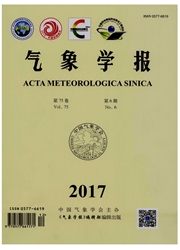

 中文摘要:
中文摘要:
利用NCEP FNLs分析资料,针对2012年7月23日、2013年7月2日下午至夜间发生在西太平洋副热带高压(副高)边缘附近暖区的对流雨带,从动力、水汽、热力和不稳定度等方面分析其产生原因,发现副高存在明显的动力、热力和对流不稳定度边界,对流雨带发生在副高的边界附近。研究结果表明,副高动力边界内部为大范围下沉运动,动力边界外侧存在弱的垂直上升运动;水汽和热力边界内部为高温、高湿,外部则相对干冷;在对流不稳定边界内部,对流不稳定层较深厚,而外部则较浅薄。在副高动力边界的外侧,水汽、热力及对流不稳定边界的内侧附近,有利的水汽条件、对流不稳定条件和动力抬升条件,使得这里容易产生对流活动,形成对流雨带。副高的动力、水汽、热力及对流不稳定度边界,对应了边界附近对流雨带的发展,相比传统的副高标志线,其物理意义更加明确,对暖区对流的预报更具指示意义。
 英文摘要:
英文摘要:
Based on the NCEP FNLs analysis data,this paper studies the mechanisms of convective rain belts developed near the warm edge of western North Pacific subtropical high (WPSH)on 23 July 2012 and 2 July 2013 from the following aspects such as dynamics,vapor,thermal factor and instability.The environment condition analysis shows that WPSH has obvious in-ner dynamic,thermal factor and instability borders,and the convective rain belts take place nearby the borders.Within the dy-namic border of WPSH,there is a downward motion in large range.But on the left side of the dynamic border,there is a weak upward motion.The air is warmer and wetter within the vapor and thermal borders of WPSH,but colder and drier outside. The convective instability within the instability border of WPSH is deeper than that outside.On the left side of the dynamic border and within the vapor,thermal and instability borders,the profitable upward motion,adequate vapor and instability con-ditions are beneficial to the development convection rain belts near the edge of WPSH.The dynamic,thermal and instability borders of WPSH well correspond to the development of convective rain belts,which shows that the physical meaning of the borders is clearer than the 588 dagpm isoline and is more significant for forecasting the convection development in the warm area near the edge of WPSH .
 同期刊论文项目
同期刊论文项目
 同项目期刊论文
同项目期刊论文
 期刊信息
期刊信息
